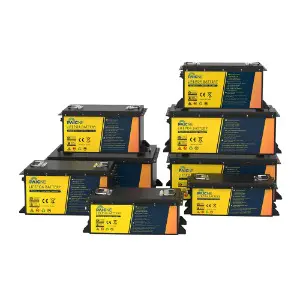Introduction to Energy Density and Battery Chemistry
Energy density is a critical parameter that defines the amount of energy a battery can store relative to its weight or volume. It directly impacts the range, weight, and size of devices such as electric vehicles, portable electronics, and energy storage systems. Lithium Iron Phosphate Battery (LiFePO4) and ternary lithium batteries—often referred to as NMC (Nickel Manganese Cobalt) or NCA (Nickel Cobalt Aluminum) batteries—represent two important categories in lithium-ion battery technology, each with unique chemical compositions and performance characteristics. Understanding how their energy densities compare helps guide appropriate battery selection for specific applications.

Fundamental Differences in Cathode Materials
The energy density of a lithium-ion battery is largely determined by its cathode chemistry. Lithium Iron Phosphate uses iron phosphate as its cathode material, which is known for thermal stability, long cycle life, and safety benefits. Ternary lithium batteries use cathodes composed of varying ratios of nickel, manganese, and cobalt or nickel, cobalt, and aluminum, designed to improve energy storage capacity and voltage output. These cathode compositions enable ternary lithium batteries to achieve higher nominal voltages and greater specific capacities compared to Lithium Iron Phosphate cells, which directly translates to higher energy density.
Quantitative Energy Density Comparison
Typical Lithium Iron Phosphate Batteries have an energy density ranging from approximately 90 to 160 watt-hours per kilogram (Wh/kg), depending on cell design and manufacturing quality. Ternary lithium batteries, in contrast, generally offer higher energy densities, often between 150 and 250 Wh/kg. This difference arises from the higher operating voltage and more efficient lithium intercalation chemistry in ternary cathodes. While the actual energy density can vary based on factors such as cell format, electrolyte composition, and electrode thickness, ternary lithium batteries maintain a clear advantage in terms of raw energy storage per unit weight.
Trade-offs in Safety and Cycle Life
While ternary lithium batteries boast good energy density, they tend to have lower thermal stability and shorter cycle lives compared to Lithium Iron Phosphate Batteries. LiFePO4 cells are prized for their good safety profile and resistance to thermal runaway, making them suitable for applications where reliability and longevity are paramount. Conversely, ternary batteries require sophisticated battery management systems to prevent overheating and mitigate safety risks. Therefore, choosing between the two chemistries often involves balancing the need for higher energy density against considerations of safety, lifecycle, and total cost of ownership.
Applications and Market Trends
The lower energy density of Lithium Iron Phosphate Batteries does not preclude their use in many modern applications. Their robustness and safety have made them popular in electric buses, stationary energy storage, and some electric vehicle segments where weight is less critical. Ternary lithium batteries dominate in smartphones, laptops, and high-performance electric cars due to their higher energy density, which allows for longer runtimes and lighter battery packs. Recent technological advances are gradually narrowing the gap, with improvements in LiFePO4 cathode coatings and electrolyte
Lithium Iron Phosphate Batteries generally offer lower energy density compared to ternary lithium batteries, typically ranging from 90 to 160 Wh/kg versus 150 to 250 Wh/kg for ternary chemistries. However, this trade-off is offset by enhanced safety, longer cycle life, and better thermal stability, making LiFePO4 a preferred choice in applications where these attributes are crucial. Selecting between these battery types requires a careful evaluation of performance requirements, safety considerations, and cost factors to determine the fit for the intended use.
Get to know quickly
We are a professional lithium iron phosphate battery, solar energy storage system, industrial and commercial energy storage system manufacturer.
 +86-133 3592 3377
+86-133 3592 3377
 +86-4008833583
+86-4008833583
 Email: [email protected]
Email: [email protected]

Copyright © Zhejiang Paichen Energy Storage Group Co., Ltd All Rights Reserved.
Battery Energy System Manufacturer
